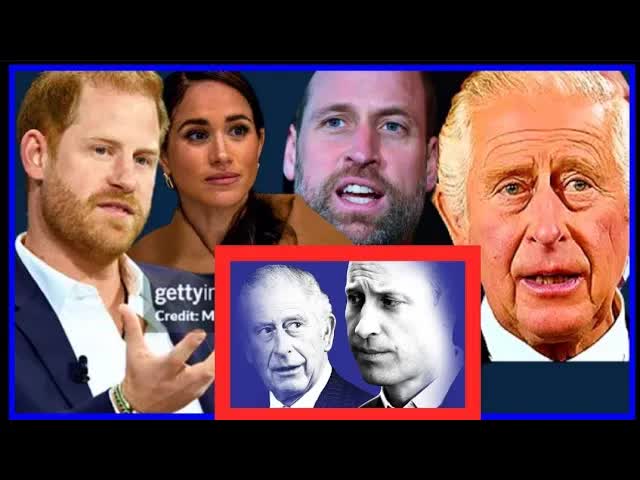The relationship between the British royal family and the media has always been a complex affair, filled with twists and turns.
This ongoing drama often resembles a dance where each party steps on the other’s toes, causing friction and controversy.
Recently, the spotlight has shifted to the treatment of the Duke and Duchess of Sussex, Harry and Meghan, highlighting a troubling pattern of negative portrayals that raises questions about the royal family’s involvement in shaping these narratives.
The British press has shown a relentless pursuit of Harry and Meghan, often crafting stories that are not just critical but downright malicious.
It leads one to wonder: how much of this negative narrative is being fueled by the royal family themselves?
After all, the media can only report on what they are fed, and the royals have long been known to feed the press.
A particularly eyebrow-raising incident involved the Christmas carol concert, where certain media figures were reportedly rewarded with invitations, seemingly as a thank-you for their negative coverage of the Sussexes.
Such actions prompt serious questions about the royal family’s complicity in the media’s portrayal of Harry and Meghan.
Instead of defending them against the barrage of negative press, it appears the royals may be tacitly endorsing it.
The relationship between the royal family and the media is undeniably symbiotic.
The press relies on royal stories to maintain their relevance, while the royals depend on media coverage to keep their public image alive.
Yet, when this interdependence results in the vilification of family members, it’s time to scrutinize its integrity.
Harry and Meghan have faced an avalanche of negative coverage, particularly after their decision to step back from royal duties.
The media was quick to label this move as a betrayal, with Meghan often bearing the brunt of the backlash.
Accusations of her being a social climber further illustrate how the media has twisted their story, painting them as out-of-touch elites despite their efforts to advocate for important issues like climate change.
The controversy surrounding their private jet usage is another example of how the couple has been unfairly targeted.
While many high-profile individuals frequently use private jets, Harry and Meghan were singled out as hypocrites for doing the same while promoting environmental causes.
This skewed narrative conveniently ignored the broader context of the couple’s lifestyle choices.
Moreover, the media’s intrusion into Meghan’s family matters has been egregious.
Her strained relationship with her father became fodder for sensational headlines, portraying her as the villain without considering the complexities of familial dynamics.
Such portrayals reveal a persistent pattern of negativity that seems to follow the Sussexes wherever they go.
But where does this narrative originate?
Is it possible that the royal family plays a part in shaping these stories?
Their long-standing relationship with the British press suggests a complicated web of influence, especially since the negative press intensified after Harry and Meghan sought a more independent path away from traditional royal life.
The royal family has a well-oiled public relations machine designed to manage its image, which raises the question: could this machinery be contributing to the negative portrayal of Harry and Meghan?
The Sussexes have hinted at feeling unprotected and isolated, especially during their explosive interview with Oprah Winfrey, where they expressed their disappointment over the lack of support from the family amid the media storm.
Timing also plays a crucial role in this narrative.
Many damaging stories about the Sussexes have emerged in conjunction with other royal news, leading some critics to suggest a strategy of deflection to divert attention.
Additionally, the double standards in media scrutiny raise eyebrows—Harry and Meghan seem to be held to a different standard than other royals, suggesting possible encouragement or tolerance of such disparities within the family.
As we peel back the layers of this intricate saga, it’s clear that the royal family’s potential involvement in the media’s portrayal of Harry and Meghan cannot be overlooked.
The evidence points toward a troubling dynamic that may not paint the royals in the best light, especially as the Sussexes continue to navigate their lives amid relentless scrutiny.
The impact of this negative media portrayal has been profound for Harry and Meghan.
Their decision to step back from royal duties in January 2020, dubbed “Megxit,” was a bold move fueled by the toll of constant media pressure.
It was not a decision taken lightly; rather, it was a necessary step for their mental health and the well-being of their family.
Their relocation to the United States signifies a quest for peace and a fresh start, away from the oppressive gaze of the British press.
In their new home, they are focusing on their projects and carving out a life free from the constraints of royal protocol.
However, the scars from their past experiences remain, serving as a stark reminder of the media’s power and the damage it can inflict when it chooses sensationalism over truth.
The relationship between the royal family, the media, and Harry and Meghan is a tangled web of power and perception.
As we continue to witness the unfolding drama, the question lingers: why should Harry and Meghan have to bear the brunt of this turmoil?
Why must they adapt while others remain untouched?
It’s crucial for us to challenge the narratives we consume and hold those in power accountable for the stories they shape.
Only then can we hope to unravel the complexities of this ongoing saga.
